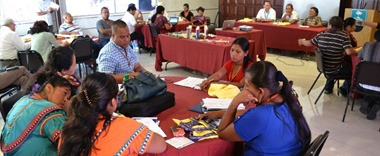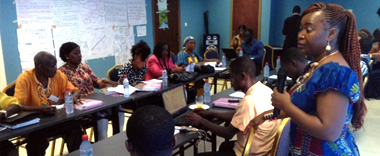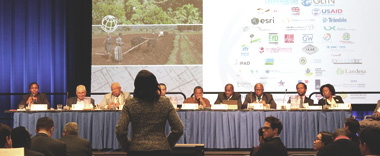Governance of tenure newsletter
2016: Putting the Voluntary Guidelines into action
Four years since the Voluntary Guidelines were endorsed by the Committee on World Food Security as the global consensus on improving tenure, their principles and processes are inspiring people around the world to take action. With wide ownership by governments, civil society and the private sector, they represent an unbiased framework in which new conversations on tenure are taking place, new skills are being developed, and new policies are being influenced in participatory ways.
Read how the Voluntary Guidelines are being used to improve tenure in Africa, Asia, Europe and Central Asia, and Latin America. These cases have been supported by FAO, working with donor partners of Belgium, European Union, Finland, France, Germany, Italy, Switzerland and the United Kingdom. There are many other similar stories.
 |
|||
|
|||
Indigenous peoples in Central America
 |
|---|
| © FAO / Ami Vitale |
In February 2016, 25 indigenous experts met in Panama City to discuss how to engage in the policy dialogue in their respective countries to improve land access and rights for indigenous communities in the context of the Voluntary Guidelines. The experts, who came from Costa Rica, El Salvador, Guatemala, Honduras, Nicaragua and Panama, will meet again in June in Panama City. Those discussions will include the results from the research and community dialogues being carried out by each participant since February. Training on how to use the Voluntary Guidelines to address tenure of indigenous peoples was provided by the Centro para la Autonomía y Desarrollo de los Pueblos Indígenas (CADPI) and FAO, with financial support from Switzerland (SDC). The experience is being incorporated into a manual on the Voluntary Guidelines for indigenous peoples that takes into consideration their communal tenure systems and customary rights. The preparation of the manual and the translation of the Voluntary Guidelines into Miskitu and Q'eqchi have been funded by the United Kingdom (DFID).
Liberia and Sierra Leone
 |
|---|
| © Christian Schulze |
Civil society organizations in Liberia and Sierra Leone are increasing their capacity to use the Voluntary Guidelines in their work. Twenty civil society representatives from each country participated in trainer-of-trainers courses and they will replicate the experience in the provinces and counties of their respective countries. The course helped participants to link the Voluntary Guidelines to their own situation and to prepare plans for using the Guidelines in their work and activities. Some representatives of Liberian CSOs participated in the Sierra Leone training and vice versa in order to foster the exchange of knowledge and to create synergies among civil society actors dealing with similar tenure issues. Additionally, the participants sensitized the public on the Voluntary Guidelines by taking part in radio and television programmes that discussed tenure governance issues in both countries. The training was led by two national CSO partners using a framework that was designed by FAO and FIAN International, as facilitator of the IPC working group on land, and with financial support from Belgium.
Scotland, United Kingdom
 |
|---|
| © Karl Mancini |
The Scottish Parliament passed a Land Reform Bill that explicitly recognises the Voluntary Guidelines as internationally accepted principles and practices for responsible practices in relation to land. The Bill, which was passed on 16 March, transforms how land is used and governed, and promotes respect for and observance of relevant human rights. It strengthens community land rights, brings new protection for tenant farmers and increases transparency of the ownership and control of land. A land commission will be established to review the impact and effectiveness of law and policy relating to land and to recommend changes. Read more.
World Bank Conference on Land and Poverty
 |
|---|
| © Deepa Shivaram |
The Voluntary Guidelines featured as an important topic throughout the 17th Annual World Bank Conference on Land and Poverty, which had the theme: “Scaling up responsible land governance”. The Voluntary Guidelines were highlighted in the opening remarks of the World Bank Vice President for Sustainable Development, and in a series of dedicated sessions and special events that presented the lessons learnt in diverse social, economic and environmental settings. Topics included the global support for the implementation of the Voluntary Guidelines; strategies for preventing fragmentation and promoting land consolidation; how partners can support implementation of the CFS-RAI; responsible governance in investments using the Voluntary Guidelines; mainstreaming and refining the SOLA open source tenure software; innovative learning approaches for governance of tenure; and a Toolkit for M&E in land investment programmes. With over 1 400 participants from over 100 countries, the conference provided opportunities for networking and learning from the experiences of others. Many participants stopped by the FAO booth to obtain copies of the Voluntary Guidelines in different languages, Technical Guides and e-learning modules. The conference was held during 14-18 March in Washington, DC, USA.
